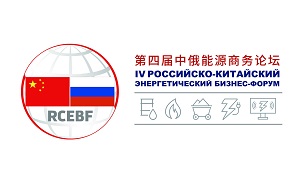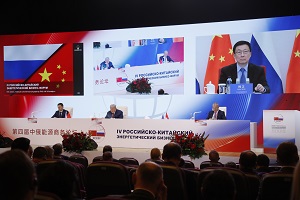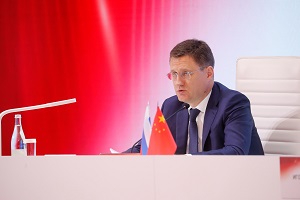Please activate JavaScript in your browser to use all interface options.
4th Russian-Chinese Energy Business Forum brings together executives of major companies, government officials and industry experts
29 November 2022
Government officials from the Russian Federation and the People’s Republic of China and executives from over 100 major Russian and Chinese companies have attended the 4th Russian-Chinese Energy Business Forum.
The reports on the development of energy cooperation between the two countries at the Forum were presented by Igor Sechin, Executive Secretary of the Commission for the President of the Russian Federation on the strategy of development of the fuel and energy industry and environmental safety, Chief Executive Officer of Rosneft Oil Company; Alexander Novak, Deputy Prime Minister of the Russian Federation; Han Zheng, Vice Premier of the State Council of the People’s Republic of China; Dai Houliang, Chairman of the CNPC Board of Directors; CEOs of Russian and Chinese companies. The Forum was also attended by ministers and government officials from the two countries, as well as representatives of the scientific community.
The strong participation once again confirmed the RCEBF’s status as the most important platform for shaping the key areas of energy dialogue between Russia and China.
The Forum was held in a face-to-face distance format at two venues in Moscow and Beijing, with a video bridge between them.
UPWARD DEVELOPMENT
President Vladimir Putin of the Russian Federation and President Xi Jinping of the People’s Republic of China sent greetings to the Forum participants, in which they noted the positive dynamics of the development of Russian-Chinese energy cooperation.
In particular, Vladimir Putin noted in his address that, despite the complexity of the international situation, relations between the Russian Federation and the People’s Republic of China continue to develop in an upward direction. The energy sector remains one of the key and most dynamic areas of economic cooperation between the two countries.
“The Russian-Chinese Energy Business Forum plays an increasingly prominent role in expanding cooperation in such an important sector, facilitating regular dialogue between representatives of government agencies, leading industry corporations, banking institutions and expert circles of the two countries. One of the Forum’s most vital activities is the creation of the “Atlas of Russian-Chinese Energy Cooperation Investments”. There is no doubt that the development of this unique information and analysis platform opens up new opportunities for mutually beneficial commercial initiatives,” reads the address of the Russian President.
CORNERSTONE OF CHINA-RUSSIA COOPERATION
In his welcoming address to the Forum, China’s President Xi Jinping declared energy to be the cornerstone of cooperation between China and Russia.
According to the PRC President, Beijing intends to build a closer partnership with Moscow in the energy sector. “The energy engagement between China and Russia is a cornerstone of practical cooperation between the two countries and also serves as an effective force for global energy security,” reads Xi Jinping’s address.
Russia and China’s energy cooperation demonstrates sustainability despite external challenges, the PRC President said.
“In the face of external risks and challenges, Russia and China are intensifying interaction and coordination, promoting major cooperation projects, demonstrating the high sustainability of Russian-Chinese energy cooperation,” reads Xi Jinping’s address.
UNIQUE OPPORTUNITIES
 Igor Sechin, Executive Secretary of the Commission for the President of the Russian Federation on the strategy of development of the fuel and energy industry and environmental safety, Chief Executive Officer of Rosneft Oil Company, delivered an address at the opening of the 4th Russian-Chinese Energy Business Forum devoted to the development of the energy dialogue between the two countries.
Igor Sechin, Executive Secretary of the Commission for the President of the Russian Federation on the strategy of development of the fuel and energy industry and environmental safety, Chief Executive Officer of Rosneft Oil Company, delivered an address at the opening of the 4th Russian-Chinese Energy Business Forum devoted to the development of the energy dialogue between the two countries.
By the end of this year, the trade turnover between Russia and China may reach $180-190 billion, Rosneft CEO believes. According to him, the figure has already reached $153.9 billion in ten months.
Thus, Igor Sechin added, the goal of reaching $200 billion in trade turnover may be achieved even earlier than in 2024, as previously planned.
Igor Sechin noted that Xi Jingping’s 2015 proposal at the rostrum of the UN to create a “community of one destiny for the humankind”, which underlay Chinese foreign policy (as part of the preamble to China’s Constitution), was a worthy response to the challenges of the growing turbulence. “The Western opponents cannot or do not want to understand the great humanitarian meaning of this idea, rejecting the concept of common destiny because of certain ideological considerations,” Igor Sechin believes. “They do not want to understand that it is not about a uniformity, which is naturally alien to the Chinese cultural tradition.” “All phenomena develop together and do not impede one another, all principles are effected together and do not contradict one another,” says a Chinese wisdom. “China simply tells the world: “We are all in the same boat.” And it turns out that China is working to unite humanity, while the West is working to divide it,” Igor Sechin said.
Rosneft CEO noted that China, like Russia, had always been against unilateral sanctions and economic pressure, which turned into selfish promotion of one’s own selfish interests, and had always advocated the universal and equal application of international law. “Nevertheless, we see that the PRC is subjected to commercial discrimination. The goal is openly set to stop China’s technological development and prevent China from becoming the Number 1 technological power,” the head of Rosneft believes. No wonder the 20th CPC Congress has paid so much attention to security, which is becoming a political priority.
Rosneft CEO emphasised the unique opportunities that the cooperation offers in terms of ensuring China’s and Russia’s economic security in sensitive areas. “In the field of resource supply, including energy resources, Russia is a reliable supplier with a huge potential that is capable of expanding. As for production and technological logistics, our partnership here seems to be the most protected in terms of security,” Igor Sechin said.
Russian energy companies, Sechin said, were ready to cooperate with Chinese partners in all areas—“in coal, in gas, in oil, in electricity and through Rosatom.”
Rosneft CEO noted that the Company had always promoted integral cooperation with Chinese partners along the entire technological chain: that is exploration and production, refining, power generation, sales at potential markets, including retail sales. “As a rule, such cooperation implies exchange of shares, setup of joint ventures, supply of equipment, and technological partnership,” he said.
POTENTIAL FOR GROWTH IN ENERGY EXPORTS
Russia’s oil exports to China in January-October 2022 increased by 9.5% year-on-year to reach almost 72 million tonnes. This put Russia in second place among the suppliers of this fuel to Beijing, only slightly behind Saudi Arabia (73.8 million tonnes), Igor Sechin said.
For his part, Russia’s Deputy Prime Minister Alexander Novak acknowledged the possibility of building new oil pipelines to China.
Rosneft CEO also reminded the audience about the Vostok Oil project that “would provide long-term, reliable, and guaranteed energy supplies to Asia’s growing economies.” The project should produce 115 million tonnes of oil by 2033, equivalent to 2.5% of current world production.
Russia also retains great potential for increasing hydrocarbon exports. For example, Sechin estimates that Rosneft alone has more than 2 trillion cubic metres of gas reserves in Eastern Siberia and the Far East that could be delivered to China.
According to Igor Sechin, Russian pipeline gas deliveries could increase by 60% this year. The figure will exceed 100 billion cubic metres a year in the foreseeable future, and Rosneft CEO is confident that this is not even the limit.
Executive Secretary of the Presidential Commission on the strategy of development of the fuel and energy industry Igor Sechin noted the prospects for liquefied natural gas: “Today Russia exports to China relatively small volumes of LNG, but in the future, the volume of LNG supplies may become comparable to our supplies from pipeline projects.”
For his part, China National Petroleum Corporation (CNPC) Chairman Dai Houliang pointed to the importance of proper operation of oil pipelines from Russia to China and the Yamal LNG project, in which CNPC has a stake.
“The implementation of the Sino-Russian gas pipeline through the Far East route and the Arctic LNG-2 project should also be accelerated,” he added.
Furthermore, according to Igor Sechin, Russia accounts for almost a quarter of China’s coal imports—53 million tonnes in the first ten months of this year. Only Indonesia supplies more coal to the PRC.
China buys from Russia not only hydrocarbons, but also electricity. Between January and October, its supplies grew by 33% and set a new record.
SETTLEMENTS IN NATIONAL CURRENCIES
 As Alexander Novak noted, Russia and China were switching to settlements in national currencies when trading energy resources: “This work helps to prevent risks and facilitate the transformation of the rouble and yuan to the status of world reserve currencies.” In addition, the two countries’ central banks are working on a settlement system outside SWIFT.
As Alexander Novak noted, Russia and China were switching to settlements in national currencies when trading energy resources: “This work helps to prevent risks and facilitate the transformation of the rouble and yuan to the status of world reserve currencies.” In addition, the two countries’ central banks are working on a settlement system outside SWIFT.
A significant step in the development of settlement in national currencies was Rosneft’s 2022 placement of an issue of bonds in yuan totalling 15 billion. According to bank analysts, this was the largest corporate bond market placement in the Russian market ever.
Executive Secretary of the Presidential Commission on the strategy of development of the fuel and energy industry Igor Sechin noted that settlements under foreign economic contracts, primarily for the supply of energy products, had been promptly adapted to the new conditions. “I consider it important to develop clearing payments between China and Russia, which could then be joined by other interested countries (EAEU, SCO, BRICS). The existence of an independent settlement system is an important component of financial sovereignty in the contemporary world,” the head of Rosneft said.
INVESTMENT ATLAS
A significant contribution to the development of energy cooperation between the two countries was the publication of the Atlas of Russian-Chinese Energy Cooperation Investments. This document is a comprehensive and practical guide to the implementation of joint projects. Its first part, presented at the previous Forum by the Russian side, was devoted to a review of the current state and prospects of development of the fuel and energy complex of the Russian Federation.
During the 4th Russian-Chinese Energy Business Forum, Zhang Jianhua, Head of the State Energy Administration of the People’s Republic of China, gave a presentation on the Chinese part of the Atlas.
The Forum brought together over 300 representatives of major Russian and Chinese companies in the oil and gas, power, coal, nuclear and renewable energy sectors, heads of federal executive authorities, power equipment manufacturers, and representatives of the financial and IT sectors. The participants discussed in detail the key issues of bilateral cooperation in the energy sector. On the sidelines of the Forum, contracts were discussed and concluded between Russian and Chinese partners on energy supply, technology development, joint research, personnel training, and involvement of Chinese companies in the procurement of goods, works and services for projects implemented in Russia.
The Russian-Chinese Energy Business Forum has been held since 2018, in line with the agreements reached by President Vladimir Putin of the Russian Federation and President Xi Jinping of the People’s Republic of China. The two leaders outlined the main objective of the Forum, that is to expand cooperation, find new areas for investment and implement promising projects in the energy sphere in Russia and China.
Since its inception, the Forum takes place under the auspices of the Commission for the President of the Russian Federation on the strategy of development of the fuel and energy industry and environmental safety and the State Energy Administration of the People’s Republic of China, and is co-organised by Rosneft and China National Petroleum Corporation.
Rosneft
Information Division
November 29, 2022

-315xx70.png)

